The term “Mother” Earth should tell you something: Female power makes the world go ’round. And the natural food movement is no exception. Today, countless women are making it their life’s work to preserve and protect the planet we all call home.
The following list of female changemakers includes just a handful of the many women who are powerful forces of change in the world of gardening, natural health, and sustainability. From starting preschool gardening programs to protecting the rights of small farmers, the women on this list are making our world a better place every day.
#1 – Jacqueline Freeman
Author, Song of Increase
Farmer, author, and beekeeper Jacqueline Freeman is celebrated for her gentle treatment and innate understanding of bees. By striving to understand the world from a bee’s perspective—and sharing this knowledge across the globe—she has taught myriad beekeepers better methods for maintaining their hives.
Freeman lives on a biodynamic farm in Washington, but her work has taken her around the world—including to the Dominican Republic via a USDA program. She was featured in the award-winning honeybee documentary Queen of the Sun.
Her recently published book, Song of Increase: Listening to the Wisdom of Honeybees for Kinder Beekeeping and a Better World, has been translated into numerous languages and can be found on every continent. To connect with Freeman and see videos of her working with thousands of bees without protective clothing, visit her website at SpiritBee.com.
#2 – Patricia Foreman
Creator, Chickens and You
“Chicken lover” is a term that falls short of truly describing Patricia Foreman. An author focusing on sustainable agriculture, Foreman is also a local foods activist and speaker. In fact, she and her famous chicken, Oprah Hen-Free, are renowned for giving presentations about raising poultry across the country.
Foreman’s love of chickens has led her to maintain her own flock of broilers, layers, turkeys, and more for over 25 years. She also cohosted the Chicken Whisperer talk show for several years, and her interviews were often featured on NPR and CBS.
Eager to help new chicken owners gain support for their flocks, Patricia has developed a Chickens and You training series that culminates in a Master Backyard Chicken Keeper Certificate. She is also the author of City Chicks and the coauthor of several other chicken-themed publications. You can find her online at ChickensAndYou.com
#3 – Stacey Murphy
Founder, BK Farmyards
Stacey Murphy is the founder and force behind BK Farmyards, an urban farm in Brooklyn dedicated to promoting work opportunities and social justice for urban teens and young adults. Working two acres of property altogether, BK Farmyards maintains a CSA, offers a Backyard Farmer Training Program, and provides educational space where thousands of beginning gardeners have learned to grow, harvest, and cook with homegrown food.
A former engineer and architect, Murphy’s most thrilled about what she’s building now: a generation of kids who are excited about growing food and learning about herbal medicine. Beyond working directly in the dirt, Murphy has written children’s books, including the Amazon bestseller My Dinosaur Ate My Broccoli. Thanks to her impact, Stacy has been featured on PBS, Martha Stewart Radio, and the David Letterman show.
#4 – Stephanie Syson
Founder, Biodynamic Botanicals
Sustainable agriculture has always been Stephanie Syson’s passion, and she spent years working directly in the dirt growing botanical herbs for food and medicine. After more than 10 years of herb-growing experience, Syson drew on her extensive knowledge of herbs to create Dynamic Roots, an herbal medicine product line.
A Certified Permaculture Designer and an educator about greenhouse management, permaculture, seed saving, and herbalism, Syson is also a lead grower of the herbs she sells through her company Biodynamic Botanicals, a Demeter-certified herb farm at high altitude in Colorado.
When she’s not growing herbs or running her businesses, Syson helps others learn about herbal medicine and sustainable agriculture and apply the benefits of both to their daily lives.
#5 – Marjory Wildcraft
Founder, The Grow Network
Though some have called her “the most dangerous woman in America,” Marjory Wildcraft’s goal for world domination is simple: She wants the world to free itself from dependency on supermarkets and drugstores.
The founder of the Grow Network, Wildcraft has helped people around the world realize that they can find food beyond the grocery store—namely, in their own backyards! The Grow Network is an online global gathering of people who produce their own food and medicine, and Wildcraft helps facilitate the conversation.
Through the Grow Network, Marjory inspires people to self-sufficiency by growing their own food and is famous for promoting techniques that provide ways to grow half your food in less than an hour a day in a small backyard garden. You can find her online at the Grow Network.
#6 – Jeannette Beranger
Author, An Introduction to Heritage Breeds
Animals have always been Jeannette Beranger’s passion, so working for the Livestock Conservancy was a natural fit. Today, Beranger is the Conservancy’s Senior Program Manager and uses her position to help implement livestock conservation programs by conducting field research and advising farmers about the best ways to utilize the unique benefits of heritage breeds.
Relying on over 30 years of experience working with heritage livestock, Beranger helped author the bestseller An Introduction to Heritage Breeds: Saving and Raising Rare-Breed Livestock and Poultry and maintains a heritage chicken and horse farm at home. Recently, Country Woman magazine honored Beranger’s conservancy work by including her on its list of “45 Amazing Country Women.”
#7 – Machaelle Small-Wright
Founder, Perelandra Center for Nature Research
As a teacher, writer, and passionate proponent of the environment, Machaelle Small-Wright is the co-founder of Perelandra, a nature research center in rural Virginia. The center was founded in 1976 and is focused on fostering healthy relationships between visitors and nature.
Perelandra is a space for anyone who wants to gain more control over their health and the environment by learning about the power of the individual. For this reason, the center teaches visitors how to live in harmony with nature in three areas: the environment, health, and the cultivation of “soil-less gardens” like businesses, homes, and creative projects.
Small-Wright is also the author of multiple books, including Behaving as if the God in All Life Mattered and Perelandra Garden Workbook I & II—A Complete Guide To Gardening With Nature Intelligences.
#8 – Judith McGeary
Founder, Farm and Ranch Freedom Alliance
As a child, Judith McGeary was a passionate horse rider and loved participating in mock trials in school. So it’s hardly surprising that she grew up to be an attorney, environmental activist, and sustainable livestock farmer in Texas.
Throughout her law practice, McGeary repeatedly watched as government regulations were proposed that were designed to benefit industrial agriculture at the cost of small family farmers. To help small farms retain their rights, McGeary founded the Farm and Ranch Freedom Alliance to aid the promotion and legislature of common sense policies for diversified farm systems.
Thanks to her work, McGeary has been featured in the magazines Texas Observer and Edible Austin, in the food documentary Farmageddon, as well as on radio shows across the country.
#9 – Carol Deppe, PhD
Founder, Fertile Valley Seeds
Getting a PhD in biology was only the beginning of Carol Deppe’s career as a plant enthusiast. As the founder and owner of Fertile Valley Seeds (FVS), Deppe is passionate about developing and distributing organic gardening seeds that have exceptional flavor and can grow well in a variety of climates.
Seeds from FVS stand out because they are open source, meaning that a patent doesn’t restrict who has access to them. Deppe believes that the best seed varieties should be available to everyone, and FVS operates with this philosophy.
Deppe is also the author of several books about organic gardening. Her popular titles include Breed Your Own Vegetable Varieties: The Gardener’s and Farmer’s Guide to Plant Breeding and Seed Saving, The Resilient Gardener: Food Production and Self-Reliance in Uncertain Times, and The Tao of Vegetable Gardening: Cultivating Tomatoes, Greens, Peas, Beans, Squash, Joy, and Serenity. You can find her online at www.CarolDeppe.com.
#10 – Nicole Telkes
Founder, Wildflower School of Botanical Medicine
Nicole Telkes is an herbal enthusiast and member of the American Herbalists Guild. She attributes her love of herbalism and wildcrafts to her maternal grandmother, an herbalist and avid mushroom and berry forager. From her, Telkes learned how to walk through the woods and observe the potential of the plants she saw around her.
She uses her extensive knowledge of ecology, biology, and herbal medicine to educate people about the use of wild herbs and responsible harvesting strategies. For the last 20 years, she has traveled throughout different regions in North America studying and experimenting with native plants.
Author of Medicinal Plants of Texas: A Guide to Locating, Growing, Harvesting, and Using Plants in Texas and the Deep South, Telkes is the founder of the Austin-based Wildflower School of Botanical Medicine, which also offers online classes. Since 2003, she has lived on an eight-acre botanical sanctuary in Central Texas.
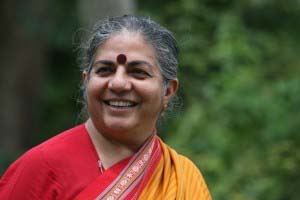
Source: http://vandanashiva.com/?page_id=22
#11 – Vandana Shiva, PhD
Founder, the Research Foundation for
Science, Technology, and Ecology
The power behind the non-GMO movement in India, Vandana Shiva, PhD, is a whirlwind of intelligence and a force of inspiration for encouraging sustainable agriculture around the world. Shiva trained as a physicist at the University of Punjab and earned her PhD in quantum theory in Canada. Since then, she has shifted her interests toward science and environmental policy, which she teaches at the Indian Institute of Science in Bangalore, India.
Founder of the Research Foundation for Science, Technology, and Ecology, Shiva is known throughout the world for her courageous activism and support of rural peasant farmers throughout South Asia. Upset about the impacts of genetic engineering on farmers who can’t afford to pay for patented seeds each year, Shiva worked to support the propagation of heirloom seeds that are genetically suited to the region in which they were developed. Her work has made major contributions to the growing field of intellectual property rights and biotechnology.
Shiva is the author of numerous books about the importance of sustainable agriculture, including The Violence of the Green Revolution: Third World Agriculture, Ecology, and Politics; Monocultures of the Mind: Perspectives on Biodiversty and Biotechnology; Biopiracy: The Plunder of Nature and Knowledge; Stolen Harvest: The Hijacking of the Global Food Supply; and more.
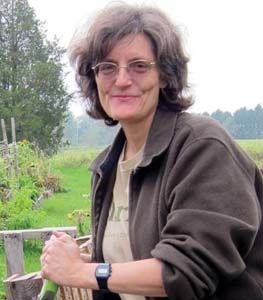
Source: http://greengardensgroup.com/ portfolio-items/dr-elaine-ingham/
#12 – Elaine Ingham, PhD
Founder, Soil Foodweb
A world-renowned soil microbiologist, Elaine Ingham, PhD, has focused on soil health for the past 30 years. She has worked with everyone from produce farmers to livestock grazers to help them understand what their soil needs to function better.
Ingham is the founder and president of Soil Foodweb, an international laboratory dedicated to assessing bacteria, fungi, nematodes, and other soil dwellers in order to understand which ratios make for the best agricultural land. The organization’s website provides information to help farmers understand the quality of their soil and grow the most resilient crops for their soil conditions.
The focus of Ingham’s work is to return the soil to full health through natural nutrient cycling, disease suppression, and other restoration techniques. She leads workshops and seminars about her findings, and her engaging, easy-to-understand presentation style has inspired countless gardeners and farmers to make the health of their soil the first priority for their fields.
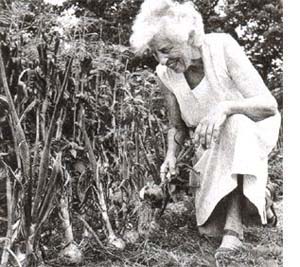
Source: http://allthedirtongardening.blogspot. com/2015/05/ruth-stout-original-naked-gardener.html
#13 – Ruth Stout
Author, How to Have a Green Thumb
Without an Aching Back
Though deceased, Ruth Stout was an American author whose “no work” gardening books and techniques are still popular today.
Though Stout was in her mid-40s before she planted her first garden, she quickly made up for lost time. During her first few seasons, Stout attempted to follow conventional techniques but found them lacking because she always had to wait for men to plow her field before she could start. Sick of wasting so much time during her already short growing seasons, Stout began experimenting with simply sticking seeds in the ground to see what would happen. When she found that her plants flourished, Stout found that she had stumbled upon an effective no-till gardening strategy.
Over the years, Stout refined her technique and eventually adopted a year-round mulching system that eliminated almost all the labor involved with traditional gardening methods. This minimalist style of cultivation proved inspiring for gardeners everywhere, and Stout published several books as well as multiyear article series in Organic Gardening and Farming Magazine.
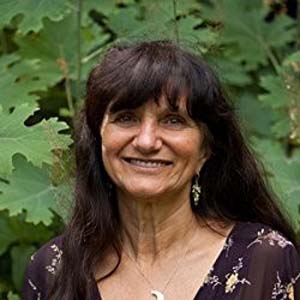
Source: https://www.amazon.com/Rosemary-Gladstar/e/B000APUXMK
#14 – Rosemary Gladstar
Founder, United Plant Savers
Like many herbalists, Rosemary Gladstar’s passion for plants began in early childhood. After she completed a middle school project on native medicinal plants in her region of Sonoma County, she was hooked for life. In her early 20s, Rosemary went on a months-long horseback riding trip with her toddler and friend to Canada. Throughout the journey, the trio relied on native plants for dinner most nights, which only enhanced Rosemary’s passion for how beneficial the plants could be to her health.
To help protect them, Rosemary founded the California School of Herbal Studies, the first herbal school in California, and Sage Mountain Herbals in Vermont. She also founded United Plant Savers, an organization dedicated to protecting native medicinal plants in the United States and Canada by preserving their native habitats and educating people about their benefits. Today, United Plant Savers has chapters around the country that are filled with passionate herbalists working to protect at-risk populations of native medicinal plants.
Rosemary is also the author of several books about herbalism, including Herbal Healing for Women, Herbs for Natural Beauty, Herbs for the Home Medicine Chest, Herbal Recipes for Vibrant Health and Planting the Future: Saving Our Medicinal Herbs.
Want To Meet Even MORE Changemakers…?
Want to spend more time learning from and supporting the work of changemakers? Consider becoming a member of the Grow Network here.
And stay tuned … because this article is No. 3 of 4 in this series, highlighting the important work of changemakers from around the world.
(Miss the previous articles in this series? Read the first article, focused on sustainable farming, here, and the second article, about changemakers in natural health, here.)
(This article was originally published October 10, 2017.)

The Grow Network is a global network of people who produce their own food and medicine. We’re the coolest bunch of backyard researchers on Earth! We’re constantly sharing, discovering, and working together to test new paths for sustainable living—while reconnecting with the “old ways” that are slipping away in our modern world. We value soil, water, sunlight, simplicity, sustainability, usefulness, and freedom. We strive to produce, prepare, and preserve our own food and medicine, and we hope you do, too!
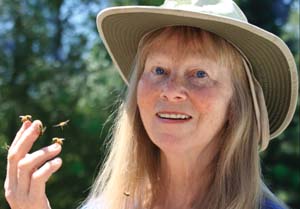
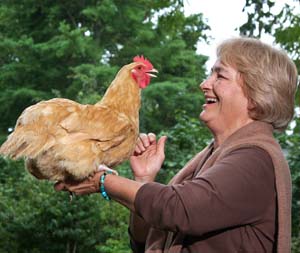
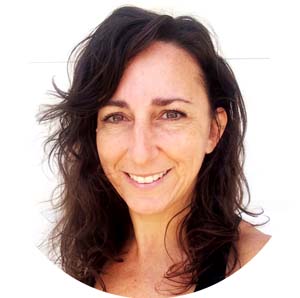
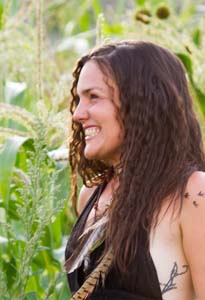
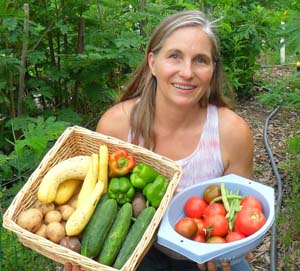
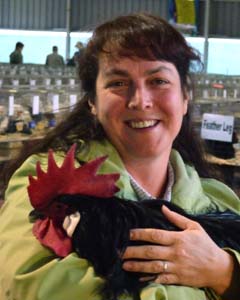
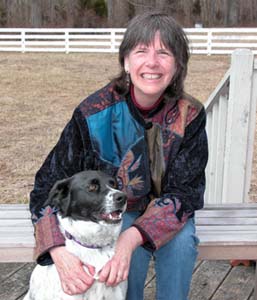
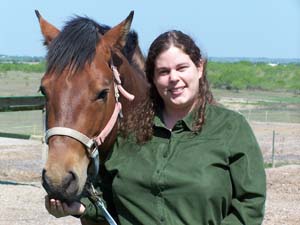
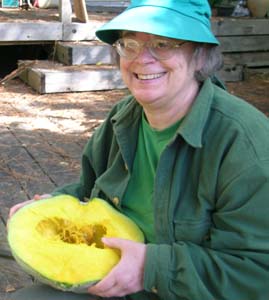
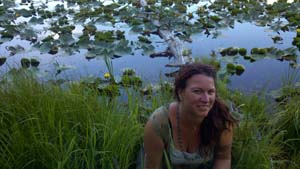
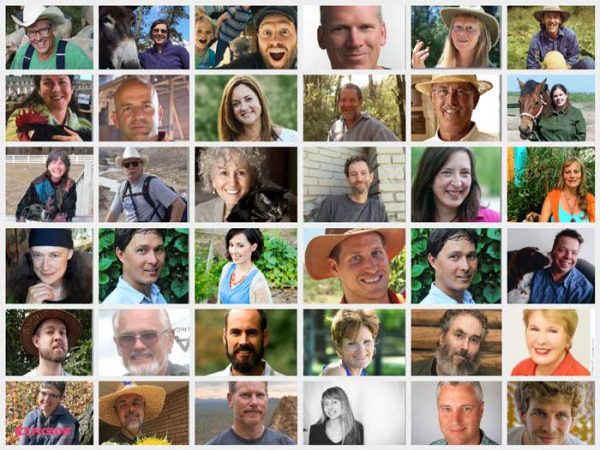







COMMENTS(17)
What I don’t see is someone who represents how to protect your produce from the toxic chem trails, how to detox soil once it is contaminated or what precautions to use once the contaminates effect the soils. I recently found a site which tells how to detox the body with three simple ingredients but I am looking for how to detox the soil as well if it is possible. Otherwise, many of your people are very informative and articles are very interesting.
Hi Renee,
Who would you suggest they put up there? Who is doing that kind of work? I think the Grow Network had a presenter on just this topic at a Summit a few years ago…. can’t remember who it was.
Wow, you’re embracing the “Identity Politics” garbage now? I’ve never understood this: By qualifying their accomplishment – 14 WOMEN leading…. – you’re implicitly stating they’re not as good as men, otherwise, why would you mention it? You didn’t mention the age, gender or race of the folks in parts 1 and 2. They’re the best or very good at what they’re doing. Period. Their age, race or gender had nothing to do with their ACCOMPLISHMENTS.
I’ll be unsubscribing as soon as I hit SEND on this. Very disappointed.
Whoa…. I think you are taking this way out of context here. The Grow Network is only trying to highlight people who are doing great work – the fact they are women is just a description…
If something this trivial upsets you, perhaps it is a good thing you are unsubscribing.
Gosh, amazing how someone can find fault in highlighting the accomplishments of amazing people…
As a woman I happen to agree – funny how I just viewed “The Bostonians” written by Henry James . Sadly, Trisha I think when you reply like that you remind me of the character from the movie, her name was Olive Chancellor. Grow Network is not about only woman, or whatever issues, indeed it is an issue that effects the entire world – animals, nature and all of humanity. By showcasing only ‘woman’ it is not “The Grow Network” but the “Women’s liberation movement”.
Trisha, it’s not trivial at all. A huge percentage of the garbage going on in this country is based upon these “trivial” distinctions. Put everyone into a category. This thinking promotes group-think instead of individuality. Instead of recognizing their accomplishments on their own merits, you’re qualifying them based upon something over which they have no control – their gender. If I had had daughters, they wouldn’t be told to go out and be the best female doctor, or female plumber, or female business owner, they’d be told to just go out and be the best. You can’t control your age, gender or race. You can control the outcomes in your life, and it diminishes your accomplishments when it is qualified by something you can’t change, and which is irrelevant.
“Accept the Challenge”, I agree with your reaction but differ with your response. I too was uncomfortable with the several politically-charged terms used in this article, yet I believe that much of it has been introduced unconsciously by the writer(s). I noticed the use of “sustainable” in ways politicized by the U.N., for instance; I noticed the use of “social justice warrior” and collectivist bywords such as “change agent”.
Still I remain a subscriber because Marjory in particular – as well as some of the others – are contributing to the ability of individuals who wish to retain their identity as individuals to thrive despite the ubiquitous pressure to conform or shut up. Some of these people were working to develop or re-introduce plants and growing techniques which promote continuously successful agriculture (the proper use of “sustainable”) before such efforts were co-opted by groups whose goals are to subsume the individual into a groupthink mindset.
I hope that you are receiving notifications of replies despite your severed subscription, and I hope that others who read this comment become aware of the unrelenting collectivist agenda being forced upon the world to destroy the options available to individuals to live as such without being forced to identify with any particular group.
Hi,
what an inspirational group of people.
Thank you very much,
Peejay from South Africa
I have shared this on my FB page, hope it reaches a few other like minded people.
I could not find the article on root cellaring
Wow! I was shocked to see a separate section for “Female Changemakers.” Is it really necessary to make the distinction? I see this as a belittling to all….and especially to women. Perhaps a little “rethinking” here is appropriate.
Found it! Ha!
Couldn’t find my comment posted earlier today. Very disappointed to see that a separate section was supplied for “women” changemakers. This is totally unnecessary and and inappropriate. Should we have special sections for contributions of “women” scientists, “women teachers,” etc.
Where is Penny Livingston, co-founder of Regenerative Design Institute in Bolinas, California? Penny has been a highly respected, international advocate for permaculture for over 25 years.
It’ll stop being worthy of note when people stop being shocked, surprised, and offended.
THEN we can dispense with highlighting people who others are actively overlooking due to their uncontrollable distinctions.
I really don’t understand why so many have their undies in a twist over this. Perhaps they need to take a step back and think about WHY they’re bothered by it. And not just stop when they hit flapping head talking points, actually think about it.
I’m happy I have a page to send my dad (and others) who keep telling me this isn’t something that women can even do. So I’m just wasting my life. Women don’t farm. Women putter around in a home garden MAYBE but they can’t be good at what they do. LOOK A WHOLE LIST!! Published in one place by a source he’ll take seriously! o/ WIN
Thanks, Mary, for being so level-headed. I couldn’t fathom what the big deal it was that she was highlighting women. I was actually encouraged by it. Come on people! Your adding to the political correctness bandwagon. Just get off that trail and see how much simpler life can be.
Carol Deppe is our local hero. She provided seeds and growing guidance for us folks on the coast. Without her we would not be able to grow corn, beans, tomatoes, or squash very well where we are at. We owe a HUGE part of our local food security to her. Thanks Carol!